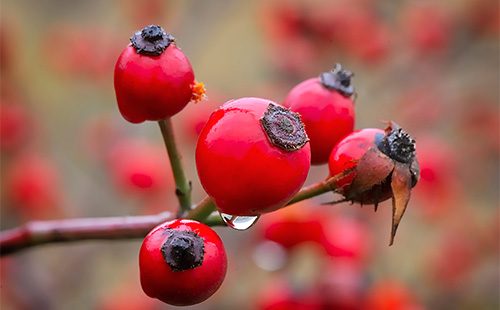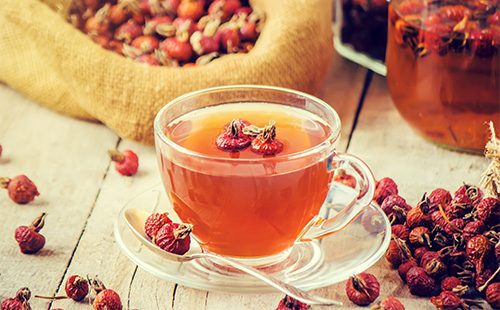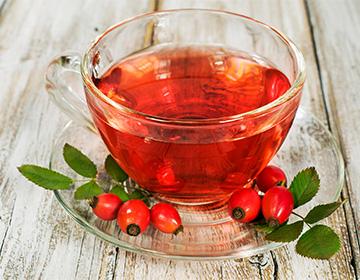The content of the article
As a medicinal plant material, the fruits of May (cinnamon) rose, as well as canine, are usually used. Other types of rose hips are also considered medicinal - sparkling, wrinkled, daurian. However, the first two are most often found in Russia, which means they are more accessible. In addition, dried raw materials are sold in pharmacies.
Useful composition
For medicinal purposes, the fruits of the plant are mainly brewed, however, leaves, flowers, seeds, as well as its underground parts also have useful properties. Wild rose is a source of valuable biologically active substances, the main role among which is vitamins:
- routine
- ascorbic acid;
- B vitamins;
- vitamin K;
- carotenoids;
- vitamin E.
Thanks to nutrients, rosehip stimulates the body's defenses, prevents the development of vitamin deficiency, and establishes metabolic processes. Also, the raw material has a capillary-stabilizing effect, establishes hematopoiesis, eliminates inflammatory processes at the local and systemic levels.
The leaves contain flavonoids that provide antioxidant and vasoprotective effects. Roots are sources of tannins, flowers - phytosterols, organic acids. The seeds revealed essential fatty acids necessary for the synthesis of cell membranes, hormones, and protective blood cells.
Indications for use of rosehip tea
The use of water extracts from various parts of the dog rose is appropriate for a number of pathological conditions.
- Decreased immunity. Tea from plant berries is the first cold medicine in folk medicine. It enhances immunity, accelerates recovery, alleviates the symptoms of the disease, accelerates the production of interferon to combat viral and bacterial infections. The drink can be taken as a preventive measure to support the defenses in the cold season.
- Disorders in the work of the kidneys. The plant is known for its mild diuretic effect, which combines antibacterial and anti-inflammatory. Therefore, they are used to prevent the occurrence and elimination of renal calculi, in the complex therapy of pyelonephritis, cystitis, urethritis, edema of renal origin.
- Digestion failure. Rosehip preparations increase the acidity of gastric juice, stimulate the release of pancreatic juice and bile. With the help of the plant, flatulence, bloating, dysbiosis, as well as inflammatory intestinal infections of an infectious nature, accompanied by diarrhea, are treated.
- Deterioration of the cardiovascular system. Water extracts from wild roses are used in the treatment of hypertension, with vascular diseases. The plant cleans them of cholesterol deposits, regulates the level of glucose in the blood. Also, the drug strengthens the capillaries, eliminating nasal and internal bleeding.
- Skin diseases. Plant extracts are used to eliminate skin lesions, inflammatory diseases of an allergic and autoimmune nature.Lotions are made with psoriasis and eczema, with sun and thermal burns, they wash the wounds, accelerate the healing of trophic ulcers and pressure sores.
The use of rose hips is useful for diabetes and liver diseases, for obesity and physical exhaustion. Also extracts from wild roses give sedative properties - with their help they eliminate the symptoms of neurosis, prolonged stress, mood changes on the background of hormonal "swing".

Contraindications
The plant should not be taken by people with individual reactions of sensitivity to the plant. Allergy is manifested by nausea, dyspeptic disorders, skin rash. Among other contraindications:
- exacerbations of chronic kidney damage;
- acute ulcerative erosive lesions of the stomach;
- hyperacid gastritis;
- bleeding disorders with a risk of thrombophlebitis.
The use of extracts from rose hips is possible in the third trimester of pregnancy - it is prescribed for edema. But you should not use the product without the permission of the doctor. Do not exceed the doses recommended by the doctor.
Rose is present in lactogon teas. They add it there as a source of vitamin C. However, the plant cannot increase the amount of breast milk, and even vice versa. Therefore, in its pure form, it is undesirable to use the plant during lactation.
The use of infusions in newborns occurs strictly under the supervision of a pediatrician. The drug is prescribed for jaundice. Some neonatologists strictly forbid giving herbal preparations to infants, other experts advise brewing rose hips, but in small concentrations, it is imperative to dilute the extract before taking it.
Recipes
Rosehip is valued for its vitamin content. However, when exposed to high temperatures, the healing components of the plant are destroyed. This is especially true with prolonged boiling of fruits. Therefore, exposure to elevated temperatures should be minimized. To facilitate the release of useful components, the fruits are pre-soaked.
From the fruit
Features This decoction is used as a choleretic and antidiarrheal agent, as well as to improve the functioning of the stomach and intestines.
Preparation and use
- A tablespoon of fruit is poured into a glass of boiling water. Insist ten hours.
- After the container is put on fire and brought to a boil. Immediately reduce the fire and simmer another five minutes.
- After two hours of additional infusion, the extract is filtered.
- Take half a glass up to four times a day.
From seed
Features Used in folk medicine for vitamin deficiency and atherosclerosis. To obtain raw materials, mature fruits are soaked, then the seeds are taken out and washed several times to remove the bristles.
Preparation and use
- A teaspoon of seeds is placed in a metal container. Pour a glass of boiling water.
- Immediately put the container on fire and after boiling it is heated for another ten minutes.
- Remove the container from the fire and insist the agent for two hours.
- After straining, take a quarter cup four times a day.
From the leaves
Features An extract from the leaves of the rose is often prescribed by herbalists to treat blood vessels, reduce blood sugar in diabetes. Also, the product has wound healing and antiseptic properties, helps in the treatment of purulent skin lesions.
Preparation and use
- A tablespoon of leaves is poured into a glass of boiling water.
- The container is put on fire, brought to a boil.
- Immediately after boiling, the container is removed from the stove, covered with a lid, left to infuse for a couple of hours.
- After filtering, take 1/3 cup inside three times a day. Make lotions, compresses or used for washing.
Tea
Features Tea is used as a cold, restorative, to stimulate metabolism during weight loss.
Preparation and use
- Two filter bags with fruits or a tablespoon of raw materials are poured with a glass of boiling water.
- The container is covered with a lid and left to infuse for at least half an hour.
- They try a drink - if necessary, dilute it with boiling water to the desired strength, add honey.
- Take a glass once a day.

Compote
Features It can be used for colds, fever, intoxication, dehydration and for its prevention.
Preparation and use
- A tablespoon of rose fruit and a tablespoon of raisins are poured into a thermos.
- Pour raw materials with a large cup of boiling water.
- They close the thermos tightly, leave to insist for four to six hours.
- Before use, filter, dilute with boiled water to taste.
The total dose of tea and compote per day for an adult should not exceed three glasses, a decoction and infusion - two glasses. After using hoods, rinse your mouth with clean water to neutralize the negative effect of acids on tooth enamel. It is better to drink drinks half an hour before a meal to ensure the full absorption of nutrients. Water extracts should be fresh, so they need to be cooked in the amount necessary for a day.

